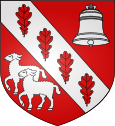Cassagnas
|
Cassagnas Cassanhaç |
||
|---|---|---|

|
|
|
| region | Occitania | |
| Department | Lozère | |
| Arrondissement | Florac | |
| Canton | Le Collet-de-Dèze | |
| Community association | Gorges Causses Cevennes | |
| Coordinates | 44 ° 16 ′ N , 3 ° 45 ′ E | |
| height | 667-1,398 m | |
| surface | 35.19 km 2 | |
| Residents | 123 (January 1, 2017) | |
| Population density | 3 inhabitants / km 2 | |
| Post Code | 48400 | |
| INSEE code | 48036 | |
| Website | Cassagnas | |
 Cassagnas - Protestant church ( temple ) |
||
Cassagnas (Occitan: Cassanhaç ) is a place and a municipality in the south of France with 123 inhabitants (as of January 1, 2017) in the Lozère department in the Occitania region .
location
The mountain village of Cassagnas is about 840 m above sea level. d. M. on the river Mimente in the middle of the Cevennes National Park about 12 km (as the crow flies) northeast of Mont Aigoual . The small town of Florac is located about 17 km (driving distance) northwest.
Population development
| year | 1800 | 1851 | 1901 | 1954 | 1999 | 2013 |
|---|---|---|---|---|---|---|
| Residents | 505 | 808 | 505 | 225 | 134 | 116 |
The continuous population decline in the 20th century is mainly due to the remote location of the place and the loss of jobs as a result of the mechanization of agriculture .
economy
For centuries, the residents of the municipality of Cassagnas lived as a self-sufficient living from agriculture: Grain was grown in the valleys, whereas the plateaus were used as pastures for cattle. In the 20th century, the former paths were turned into roads, which increased emigration. Today one still lives from a little agriculture and cattle breeding, but since the 1970s and 1980s tourism and in particular the rental of holiday apartments ( gîtes ) has played the most important role in the economic life of the municipality.
history
The area was already visited in the Neolithic by hunters and gatherers , perhaps even by shepherds ; very gradually people settled down.
The remote place and its residents stayed away from the major events in the region, e.g. B. the Huguenot and Camisard Wars in the 16th and 17th centuries or at the beginning of the 18th century, largely unaffected; nevertheless the church of the place was destroyed. Part of the population is Protestant .
Attractions
- The place itself is a mountain village without a church with some older stone houses.
- The Protestant church ( temple ) is an unadorned building with a simple bell gable ( clocher mur ) from the 19th and early 20th centuries. Inside there are two lateral galleries and the pulpit.
- Behind the church is the cemetery with the grave of Hans Mosch, a German-born member of the Resistance who was killed by the Waffen SS in 1944 .
- outside
- A circular hiking trail runs south of Cassagnas, which also leads to a lookout point with a menhir .
